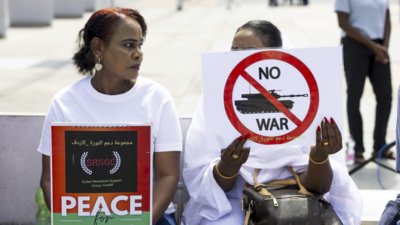
Global diplomats and aid officials convene in London to address Sudan's escalating humanitarian crisis, stemming from a two-year conflict. The war has displaced millions and triggered famine. Hosted by several nations and organizations, the conference aims to provide relief, focusing on aid delivery. Despite the severity, neither the Sudanese government nor the rival Rapid Support Forces were invited.
LONDON: Diplomats and aid officials from around the world are meeting Tuesday in London to try to ease the suffering from the 2-year-old war in Sudan, a conflict that has killed tens of thousands of people, displaced 14 million and pushed large parts of the country into famine.
The one-day conference, hosted by Britain, France, Germany, the European Union and the African Union, has modest ambitions. It is not an attempt to negotiate peace, but an effort to relieve what the United Nations calls the world's worst humanitarian crisis.
Attendees include officials from Western nations, international institutions and neighboring countries - but no one from Sudan. Neither the Sudanese government nor the rival paramilitary it is fighting has been invited.
"The brutal war in Sudan has devastated the lives of millions - and yet much of the world continues to look away," said British Foreign Secretary David Lammy, who visited Chad's border with Sudan in January. "We need to act now to stop the crisis from becoming an all-out catastrophe, ensuring aid gets to those who need it the most."
Sudan plunged into war on April 15, 2023, after simmering tensions between the Sudanese military and a paramilitary organization known as the Rapid Support Forces. Fighting broke out in the capital, Khartoum, and spread across the country, killing at least 20,000 people - though the number is likely far higher.
Last month the Sudanese military regained control over Khartoum, a major symbolic victory in the war. But the RSF still controls most of the western Darfur region and some other areas.
The war has driven parts of the country into famine and pushed more than 14 million people from their homes, with more than 3 million fleeing the country, to neighboring countries including Chad and Egypt. Both sides in the war have been accused of committing war crimes.
The World Food Program says nearly 25 million people - half of Sudan's population - face extreme hunger.
Aid agency Oxfam said the humanitarian catastrophe risks becoming a regional crisis, with fighting spilling into neighboring countries. It said that in South Sudan, itself wracked by recent war, "the arrival of people fleeing Sudan's conflict has put more pressure on already scarce resources, which is deepening local tensions and threatening the fragile peace."
The U.S., which recently cut almost all its foreign aid, is expected to be represented at the London conference.
Ahead of the meeting, Lammy announced 120 million pounds ($158 million) in funding for the coming year to deliver food for 650,000 people in Sudan, from Britain's increasingly limited foreign aid budget.
In February the U.K. cut its aid budget from 0.5% of Gross Domestic Product to 0.3% to fund an increase in military spending. Prime Minister Keir Starmer has said Sudan, along with Ukraine and Gaza, will remain a priority for British aid.

 1 day ago
3
1 day ago
3










 English (US) ·
English (US) ·